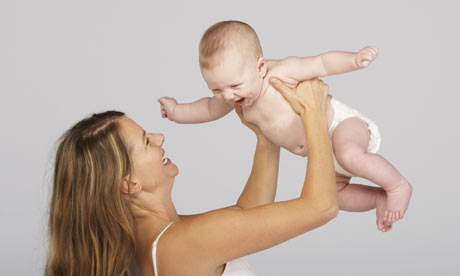
The government is to revamp antenatal classes for new parents to include training in how to look after their babies under a plan to improve children's health from the age of 0-19.
The new lessons will be increasingly modelled on those provided by charities such as the National Childbirth Trust.
Fathers will be encouraged to stay in the labour ward during the birth to get them more involved with their children and both parents will be targeted with information about what help they can get if they are concerned about their child's health, from its birth until they leave home.
The child health strategy, published today by the Department for Health and Department for Children, Schools and Families, sets out how schoolchildren will be encouraged to do more sports and eat a healthy school lunch. A major new campaign will be launched later this year to promote contraception to teenagers, responding to fears that they avoid it because of urban myths.
The plans were welcomed by family campaigners but criticised for failing to provide new support for teenagers. Opposition MPs said the plans "lacked ambition".
A strategy for child health was promised in December 2007 when the children's secretary, Ed Balls, published a five-year children's plan. The document produced today, 'Healthy lives, brighter futures', collates many of the individual programmes already in place to improve child health. It does not include in-depth plans to tackle major issues such as obesity, smoking or pregnancy among young people, which have their own separate strategies.
There is significant new funding for children with particular health problems. A total of £340m is being allocated to support children with disabilities and their families, and will be invested in palliative care and end-of-life services, short breaks, community equipment and wheelchair services.
Belinda Phipps, chief executive of the National Childbirth Trust, said the charity would be on the steering committee to design the pilots of the new antenatal classes: "Thank goodness at last they seem to have recognised that the key thing for children is that parents are supported to do a good job for their children."
However, Anne Longfield, chief executive of the charity 4Children, said: "It is disappointing that despite a plethora of recent reports alerting us to the desperate health problems of today's teenagers, this strategy falls short of addressing the needs of millions of older children."
The shadow health secretary, Andrew Lansley, said: "We are also worried that the plans lack ambition. Instead of a bold set of announcements we have a collection of borrowed and watered-down plans which don't go far enough in giving children's health services the boost they need."
The children's secretary said: "We know good health is vital if children and young people are to enjoy their childhood and achieve their full potential. We want to back all parents as they bring up their children, and ensure that every child or young person leads as healthy a possible life."
What parents should expect
After their child's birth:
• A new antenatal and preparation for parenthood programme;
• An expansion of the family nurse partnership programme, providing intensive support to vulnerable new parents in 70 areas of the country;
• More health visitors based in children's centres;
When their child reaches school:
• A new Healthy Child Programme which will set out to parents the services they can expect to improve their child's health from free swimming to exercise classes;
• Previously announced pilots of free school meals and plans to make personal, social, health and economic education, including sex education, compulsory;
As teenagers:
• A £27m campaign to improve young people's knowledge of contraception to increase teenagers' "knowledge and trust" in the full range of contraception to tackle urban myths around safer sex.

